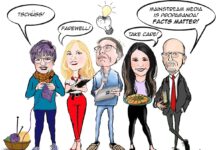
Social Media Plays a Big Role in Information the Public Receives
Most people agree that having free media outside of government control is a necessity for a democratic nation. But many experts will say that free media will continue to affect elections from the local level to the national level in both good and bad ways.
In the last two presidential elections, the actions of the media made headlines. Many claimed that the media aided candidates based on whether they shared information.
When presidential candidate Hillary Clinton lost the election in 2016 she blamed Russia, the FBI director and the news media for her loss. Clinton claimed that she would have been president if a letter from FBI Director Jim Comey had not been released shortly before the election.
“If the election had been on Oct. 27, I would be your president,” Clinton told moderator Christiane Amanpour, the CNN anchor, at a Women for Women International event in New York. “I was on the way to winning until the combination of Jim Comey’s letter on Oct. 28 and Russian WikiLeaks raised doubts in the minds of people who were inclined to vote for me but got scared off — and the evidence for that intervening event is, I think, compelling [and] persuasive.”
During the 2020 presidential election, many people blamed media outlets for helping Joe Biden win when they chose not to run stories on his son Hunter Biden’s business dealings. Many of the emails found on the laptop have been authenticated since then leading some to claim that mainstream media outlets were too soft on the Bidens.

How Has Media Affected Elections in the Past?
Even though media has changed greatly over the last century, new forms of media have always been utilized to help politicians. According to an article published by Maryville University, politicians utilizing new forms of media can be traced back to the Franklin D. Roosevelt days when he used radio to help him get elected. John F. Kennedy then used television to help bridge communication gaps between politicians and the public.
Former President Barack Obama was then the first presidential candidate to use social media to his advantage. Before he won the election in 2008, Obama used a variety of social media platforms to build a big following and connect to voters.

Ways Media Can Affect Elections
An article published by the University of Oregon describes six ways the media can influence elections. For one, the media often chooses who to cover and how much press time to give them. And since name recognition is key when it comes to elections, the choices can have an effect.
Another point is that with the polarization of America, media sources have chosen to cater to audiences based on political affiliations. The new world of politicized media sources allows for scripts to be created and biases to develop.
“For example, in 2000, the script for Al Gore was that he was a pompous bore, and the script for George W. Bush was that he wasn’t very smart,” said Regina Lawrence, executive director of Oregon University’s School of Journalism and Communication’s Agora Journalism Center and George S. Turnbull Portland Center.
The media has also been known to use pictures to help convey messages. “A picture is worth a thousand words” speaks to the fact that visuals can carry a more powerful impact than written words. Media have often used pictures to help with the scripts and biases they create.

Social Media’s Influence on Elections Could Be Changing
The growth of social platforms has affected elections both positively and negatively. On the positive side, social platforms can help generate more voters by using peer pressure to create a social norm around voting. Social media has also given political candidates a way to connect directly with voters; before they had to go through a traditional source to get information across instead of just releasing it on their own.
On the negative side, research published in the Proceedings of the National Academy of Sciences in 2021 social media can create “echo chambers” where beliefs get reinforced as opposed to being challenged. These echo chambers can lead to the bandwagon effect causing people to vote the same as others with similar political beliefs.
Social media has also given a rise to the spread of misinformation, which was evident in the 2016 election when according to the Maryville University article, many blamed Russia for using “tactics such as propaganda, troll farms, and bots to leak false news stories and sow disorder.”
But according to statistics, social media’s influence on the political climate could be on the decline. The Maryville University article quoted some findings by the Pew Research Center on political perceptions and social media for the 2016 and 2020 elections.
“The number of people who found political discussions via social media ‘interesting and informative’ decreased from 35% in 2016 to 26% in 2020,” the article reported. “About 55% of social media users in the U.S. felt ‘worn out’ by the number of political posts on social media, up nearly 16% since the 2016 presidential election. Nearly 70% of individuals said that talking about politics on social media with people on the opposite side was often ‘stressful and frustrating,’ compared with 56% in 2016.”
Media’s Role in Local Elections
Rick Langenberg, owner of The Mountain Jackpot newspaper has been in the industry for over 30 years and says local news often plays a big role in the outcome of local elections.
Langenberg said that when it comes to elections of local leaders, local news outlets (like The Mountain Jackpot which is a weekly newspaper in Teller County) try to stay as unbiased as possible. But he says that smaller news outlets have made an impact on some ballot issues getting passed.
“We do the best we can to be neutral and not endorse particular candidates,” Langenberg explained. “But when it comes to ballot issues I feel we play a big role. Issues that benefit the community as a whole we try to get behind. For issues like gaming and even marijuana, I think us and the Colorado media played a big role in those getting endorsed as much as they did.”
Langenberg said that the polarization between Democrats and Republicans has become an issue locally as now Teller County is mostly dominated by the Republican Party. He said that when he first started the weekly newspaper in the early 1990s local elections were decided by small numbers. Now a small group of people chooses all of the local leaders as many elections get decided during the Republican primaries, which makes it “frustrating” for the media to provide fair coverage.
He said that social media has also affected what media sources report. “We have done our best to try to treat all political candidates equally,” Langenberg said. “We have to watch social media sources because there are a lot of untruths out there. Probably the biggest challenge with social media is that we have to decipher the truths from the untruths. For example, with the recent local school board election, we saw a new trend where social media dominated people’s opinion and they won the race because of it.”
Langenberg said that he thinks that the media will continue to have control in future elections, especially when it comes to ballot issues. “I think that social media will probably end up determining a lot of smaller local elections,” he said.
Read more about local elections at The Maverick Observer.









